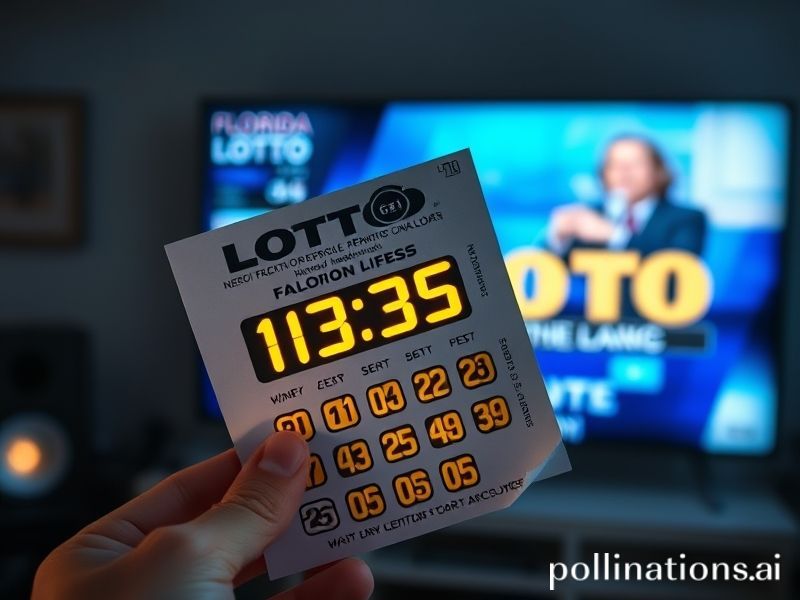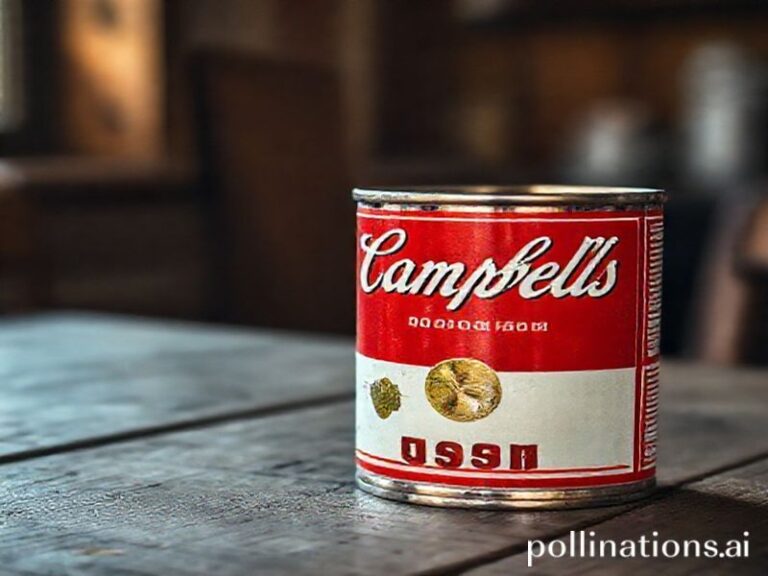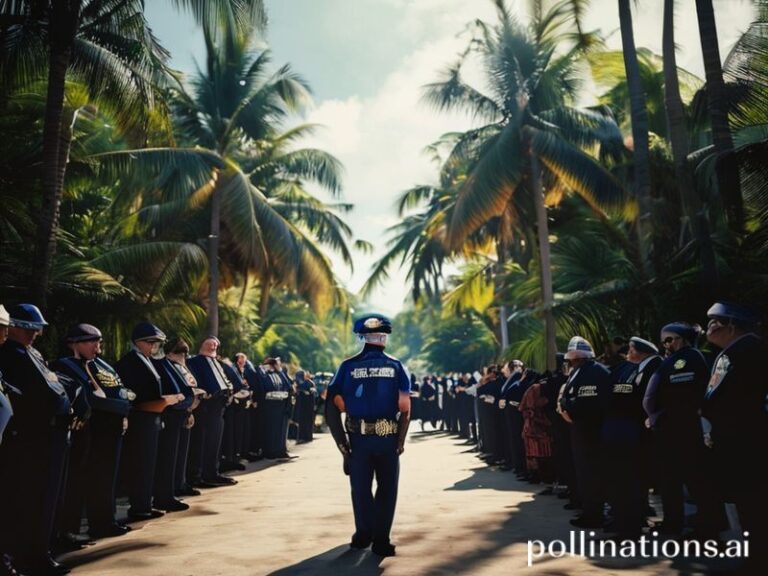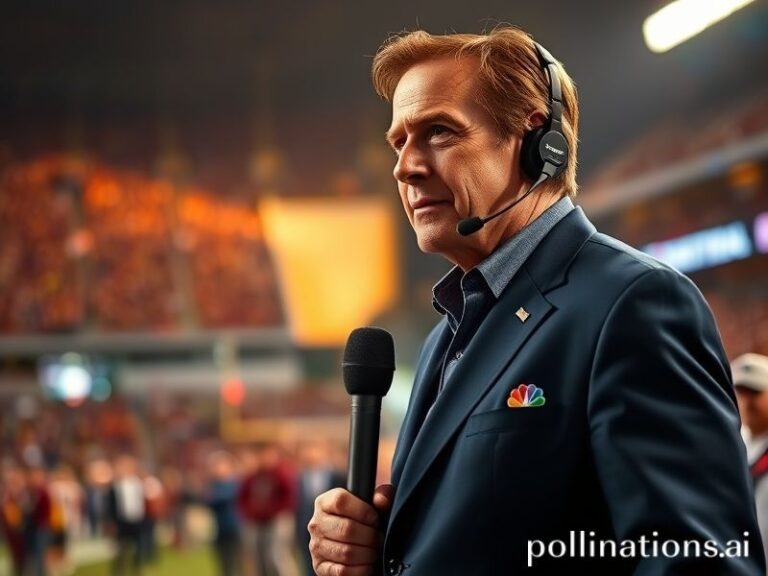Florida Lottery Results: How a $36M Jackpot Became the World’s Cheapest Therapy
Florida Lottery Results: A Sun-Bleached Beacon of Hope in the Global Panic Room
Bylines from Tallahassee to Timbuktu
TALLAHASSEE—While bond markets convulse in Frankfurt and Shanghai’s property giants play Jenga with concrete promises, the Florida Lottery on Wednesday night announced that a single ticket—purchased somewhere between a Daytona vape shop and a retirement village—has snagged the $36 million jackpot. The numbers (9-17-21-34-46, with a Powerball of 14, for those keeping score from the Caracas blackouts or the Kyiv metro shelters) may look random, but to the international spectator they read like coordinates on the global mood ring: irrational optimism, 80-proof.
To the untrained eye, this is merely provincial news. Yet from the vantage of Davos lounges where champagne flutes tremble whenever someone mentions the word “recession,” the Florida draw functions as a low-cost stress test for the human spirit. If people still fork over two dollars for a paper hallucination, central bankers reason, then surely they’ll keep swallowing interest-rate hikes like breath mints. The IMF, ever hungry for metaphors, has quietly added “lottery elasticity” to its 2024 risk dashboard—right between “crypto contagion” and “civil-military fusion.”
Across continents, the draw’s ripple effects are felt in ways that would make Newton blush. In Lagos, where the naira has the half-life of a Snapchat story, numbers are already being reverse-engineered into sure-fire Whatsapp “sure-wins.” Somewhere in rural Punjab, a farmer who once bet on monsoon patterns is now Googling “Florida Powerball mantra.” And in London, a hedge-fund quant with a first from Oxbridge has built an algorithm that scrapes Florida lottery data to predict emerging-market volatility—because nothing says “sound financial planning” like treating the dreams of Tampa dental hygienists as tradable derivatives.
The winner—identity still cloaked under Florida’s delightfully theatrical “Trust Me, I’m Anonymous” statute—now faces the timeless dilemma: lump sum or annuity? Translated into global parlance, that’s “Swiss numbered account today” versus “slow-drip legitimacy for the heirs once the Senate finishes investigating crypto campaign donations.” Either way, the money will migrate faster than a tax exile with dual passports, sloshing through Delaware LLCs, Cayman shells, and, rumor has it, a Maltese citizenship-by-investment condo with a gold-leaf bidet. Somewhere, a compliance officer sighs into his fourth espresso and updates the “Politically Exposed Floridian” spreadsheet.
Meanwhile, the losers—i.e., the other 9.7 million ticket holders—return to their regularly scheduled dystopias. In Paris, they shrug and buy a baguette. In Beirut, they shrug and buy a generator. In Florida itself, they shrug and buy another ticket, because the state has graciously installed vending machines next to opioid clinics, ensuring that hope and hydrocodone remain equidistant. The convenience-store clerks, trained like UN peacekeepers in conflict de-escalation, hand out complimentary sunscreen with every losing slip—SPF 50, to shield customers from both melanoma and metaphor.
Environmentalists note, with the cheerful despair they bring to most conversations, that enough lottery paper is printed annually to wallpaper the Everglades twice over. Climate negotiators in Bonn briefly floated a “carbon-neutral scratch-off” pilot before realizing that the only sustainable gamble is not gambling—an idea promptly tabled until 2050, pending further studies and a Powerball rollover.
What does it all mean? Simply this: in a world where supply chains unravel like cheap knitwear and democracies reboot every news cycle, the Florida Lottery persists as the last honest supply chain—raw hope in, processed fantasy out, zero middlemen except the state, which takes its modest 40 percent vigorish to fund education and, ironically, gambling-addiction hotlines. If that strikes you as circular logic, congratulations: you’ve grasped the entire global economy without an MBA.
So place your bets, dear planet. Whether you’re sheltering from shelling in Kharkiv or sipping negronis in Monaco, the next Florida draw is only 72 hours away—just enough time for the universe to deliver another plot twist or another war. Either way, the numbers will keep tumbling, proof that entropy loves an audience. And somewhere under the sodium lights of a 24-hour Publix, a retiree who once practiced duck-and-cover drills will whisper, “This one’s for the free world,” before kissing her ticket like it’s the Cold War and the ticket is the Pope’s ring.
In the end, the jackpot isn’t cash; it’s the brief, blinding illusion that order can be purchased two dollars at a time. God bless—if that’s still legal where you live.







